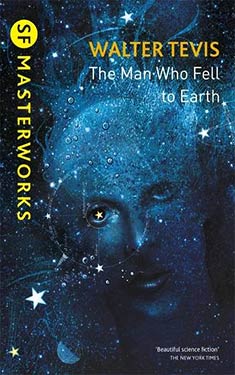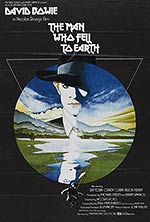
Added By: Administrator
Last Updated: illegible_scribble
The Man Who Fell to Earth
| Author: | Walter Tevis |
| Publisher: |
Gollancz, 2016 Del Rey / Ballantine, 1999 Gold Medal Books, 1963 |
| Series: | |
|
This book does not appear to be part of a series. If this is incorrect, and you know the name of the series to which it belongs, please let us know. |
|
| Book Type: | Novel |
| Genre: | Science-Fiction |
| Sub-Genre Tags: | First Contact Near-Future Soft SF |
| Awards: | |
| Lists: | |
| Links: |
|
| Avg Member Rating: |
|
|
|
|
Film & Television Adaptations
Synopsis
T.J. Newton is an extraterrestrial who goes to Earth on a desperate mission of mercy. But instead of aid, Newton discovers loneliness and despair that ultimately ends in tragedy.
Excerpt
1985:
Icarus descending
AFTER TWO MILES of walking he came to a town. At the town's edge was a sign that read Haneyville: Pop. 1400. That was good, a good size. It was still early in the morning--he had chosen morning for the two-mile walk, because it was cooler then--and there was no one yet in the streets. He walked for several blocks in the weak light, confused at the strangeness--tense and somewhat frightened. He tried not to think of what he was going to do. He had thought about it enough already.
In the small business district he found what he wanted, a tiny store called The Jewel Box. On the street corner nearby was a green wooden bench, and he went to it and seated himself, his body aching from the labor of the long walk.
It was a few minutes later that he saw a human being.
It was a woman, a tired-looking woman in a shapeless blue dress, shuffling toward him up the street. He quickly averted his eyes, dumbfounded. She did not look right. He had expected them to be about his size, but this one was more than a head shorter than he. Her complexion was ruddier than he had expected, and darker. And the look, the feel, was strange--even though he had known that seeing them would not be the same as watching them on television.
Eventually there were more people on the street, and they were all, roughly, like the first one. He heard a man remark, in passing, "... like I say, they don't make cars like that one no more," and, although the enunciation was odd, less crisp than he had expected, he could understand the man easily.
Several people stared at him, a few of them suspiciously; but this did not worry him. He did not expect to be molested, and he was confident after observing the others that his clothes would bear up under inspection.
When the jewelry store opened he waited for ten minutes and then walked in. There was one man behind the counter, a small, chubby man in a white shirt and tie, dusting the shelves. The man stopped dusting, looked at him for a moment, a trifle strangely, and said, "Yes sir?"
He felt over tall, awkward. And suddenly very frightened. He opened his mouth to speak. Nothing came out. He tried to smile, and his face seemed to freeze. He felt, deep in him, something beginning to panic, and for a moment he thought he might faint.
The man was still staring at him, and his look seemed not to have changed. "Yes sir?" he said again.
By a great effort of will he was able to speak. "I ... I wonder if you might be interested in this ... ring?" How many times had he planned that innocuous question, said it over and over to himself? And yet now it rang strangely in his ears, like a ridiculous group of nonsense syllables.
The other man was still staring at him. "What ring?" he said.
"Oh." Somehow he managed a smile. He slipped the gold ring from the finger of his left hand and set it on the counter, afraid to touch the man's hand. "I ... was driving through and my car broke down. A few miles down the road. I don't have any money; I thought perhaps I could sell my ring. It's quite valuable."
The man was turning the ring over in his hands, looking at it suspiciously. Finally he said, "Where'd you get this?"
The way the man said it made his breath choke in his throat. Could there be something wrong? The color of the gold? Something about the diamond? He tried to smile again. "My wife gave it to me. Several years ago."
The man's face was still clouded. "How do I know it isn't stolen?"
"Oh." The relief was exquisite. "My name is in the ring." He pulled his billfold from his breast pocket. "And I have identification." He took the passport out and set it on the counter.
The man looked at the ring and read aloud, "T.J. from Marie Newton, Anniversary, 1982," and then "18 K." He set the ring down, picked up the passport, and leafed through it. "England?"
"Yes, I'm an interpreter at the United Nations. This is my first trip here. Trying to see the country."
"Mmm," the man said, looking at the passport again. "I figured you talked with an accent." When he found the picture he read the name. "Thomas Jerome Newton," and then, looking up again. "No question about that. This is you, all right."
He smiled again, and this time the smile was more relaxed, more genuine, although he still felt lightheaded, strange--always there was the tremendous weight of his own body, the weight produced by the leaden gravity of this place. But he managed to say pleasantly, "Well then, would you be interested in buying the ring...?"
He got sixty dollars for it, and knew that he had been cheated. But what he had now was worth more to him than the ring, more than the hundreds of rings just like it that he had with him. Now he had the first beginnings of confidence, and he had money.
With some of the money he bought a half pound of bacon, six eggs, bread, a few potatoes, some vegetables--ten pounds of food altogether, all that he could carry. His presence aroused some curiosity, but no one asked questions, and he did not volunteer answers. It would not make any difference; he would not be back in that Kentucky town again.
When he left the town he felt well enough, in spite of all of the weight and the pain in his joints and in his back, for he had mastered the first step, he had made his start, he now owned his first American money. But when he was a mile from the town, walking through a barren field, toward the low hills where his camp was, all of it suddenly came over him in one crushing shock--the strangeness of it, the danger, the pain and worry in his body--and he fell to the ground and lay there, his body and his mind crying out against the violence that was being done to them by this most foreign, most strange and alien of all places.
He was sick; sick from the long, dangerous trip he had taken, sick from all the medicine--the pills, the inoculations, the inhaled gases--sick from worry, the anticipation of crisis, and terribly sick from the awful burden of his own weight. He had known for years that when the time came, when he would finally land and begin to effect that complex, long-prepared plan, he would feel something like this. This place, however much he had studied it, however much he had rehearsed his part in it, was so incredibly alien--the feeling, now that he could feel--the feeling was overpowering. He lay down in the grass and became very sick.
He was not a man; yet he was very much like a man. He was six and a half feet tall, and some men are even taller than that; his hair was as white as that of an albino, yet his face was a light tan color; and his eyes a pale blue. His frame was improbably slight, his features delicate, his fingers long, thin, and the skin almost translucent, hairless. There was an elfin quality to his face, a fine boyish look to the wide, intelligent eyes, and the white, curly hair now grew a little over his ears. He seemed quite young.
There were other differences, too: his fingernails, for example, were artificial, for he had none by nature. There were only four toes on each of his feet; he had no vermiform appendix and no wisdom teeth. It would have been impossible for him to develop hiccups, for his diaphragm, together with the rest of his breathing apparatus, was extremely sturdy, very highly developed. His chest expansion would have been about five inches. He weighed very little, about ninety pounds.
Yet he did have eyelashes, eyebrows, opposed thumbs, binocular vision, and a thousand of the physiological features of a normal human. He was incapable of warts; but stomach ulcers, measles and dental caries could affect him. He was human; but not, properly, a man. Also, manlike, he was susceptible to love, to fear, to intense physical pain and to self-pity.
After a half hour he felt better. His stomach was still trembling and he felt as if he could not lift his head; but there was a sense that the first crisis was past and he began to look more objectively at the world around him. He sat up and looked across the field he was in. It was a grubby, flat pasture, with small areas of brown grass, a broom sage, and patches of glassy, refrozen snow. The air was quite clear and the sky overcast, so that the light was diffused and soft and did not hurt his eyes as the glaring sunlight had two days before. There were a small house and a barn on the other side of the clump of dark and barren trees that fringed a pond. He could see the water of the pond through the trees, and the sight of it made his breath catch, for there was so much of it. He had seen it before like that, in his two days on earth; but he was not yet used to it. It was another of those things that he had expected but was still a shock to see. He knew, of course, about the great oceans and about the lakes and rivers, had known about them since he was a boy; but the actual sight of the profusion of water in a single pond was breathtaking.
He began to see a kind of beauty in the strangeness of the field, too. It was quite different from what he had been taught to expect--as, he had already discovered, were many of the things of this world--yet there was pleasure now for him in its alien colors and textures, its new sights and smells. Its sounds, too; for his ears were very acute and he heard many strange and pleasant noises in the grass, the diverse rubbings and clickings of those insects that had survived the cold weather of early November; and even, with his head now against the ground, the very small, subtle murmurings in the earth itself.
Suddenly there was a fluttering in the air, an uprush of black wings, then hoarse, mournful calling, and a dozen crows flew overhead and away across the field. The Anthean watched them until they were out of sight, and then he smiled. This would be, after all, a fine world....
Copyright © 1963 by Walter Tevis
Reviews
Images
No alternate cover images currently exist for this novel.



















 Full Details
Full Details











